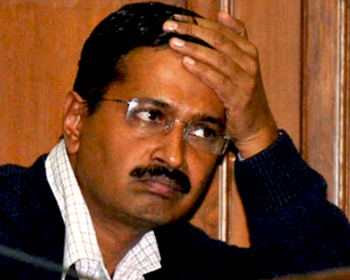New Delhi, Mar 17: Delhi Chief Minister Arvind Kejriwal and two other AAP leaders including Deputy CM Manish Sisodia were today directed by a court here to appear before it later in the day in connection with a criminal defamation complaint, saying there was no ground for exemption from their appearance.
Metropolitan Magistrate Mayuri Singh took strong view of absence of Kejriwal, Sisodia and Yogendra Yadav, and said they "have no respect for the law".
 The three AAP leaders have, however, sought exemption from personal appearance for the day on the ground that the lawyers are on strike and the case was at a crucial stage and the presence of advocates was necessary.
The three AAP leaders have, however, sought exemption from personal appearance for the day on the ground that the lawyers are on strike and the case was at a crucial stage and the presence of advocates was necessary.
The case was put up before magistrate Singh as Metropolitan Magistrate Muneesh Garg, before whom the matter was going on, was on leave today.
The court had earlier directed Kejriwal, Sisodia and Yadav to positively appear before it today as it was scheduled to pass order in the issue of framing of charges.
During the hearing, the court said the exemption application displayed no reason for the absence of the accused.
"There is nothing to reflect why accused (Kejriwal, Sisodia and Yadav) have not appeared. Accused have no respect for law. Considering no one has appeared for accused, I am keeping the matter pending at 2 PM. Call at 2 PM," the magistrate said.
The court noted that a clerk appeared on behalf of the accused and his advocates and moved the exemption plea.
The complainant, advocate Surender Kumar Sharma, opposed the plea saying the lawyers are on strike and not the litigants and it would not be in the interest of justice if any adjournment is given in the case as the case had earlier been adjourned three times due to absence of the accused.
Sharma had alleged that in 2013 he was approached by volunteers of AAP who had asked him to contest the Delhi Assembly elections on a party ticket, saying Kejriwal was pleased with his social services.
He filled up the application form to contest the polls after being told by Sisodia and Yadav that AAP's Political Affairs Committee of the party had decided to give him the ticket. However, it was later denied to him.
On October 14, 2013, the complainant claimed, articles in leading newspapers carried "defamatory, unlawful and derogatory words used by the accused persons" which have lowered his reputation in the Bar and the society.
The court, which had earlier reserved its order for February 11, had granted exemption to the three AAP leaders from personal appearance for that day and had given them a last opportunity to positively appear before it today.
Kejriwal had sought exemption from personal appearance for that day on the ground that he had to meet Union Home Minister Rajnath Singh after the Delhi Assembly elections results which were announced on February 10.
The summons were issued on the complaint under sections 499, 500 (defamation) and 34 (common intention) of the IPC, with the court saying there was prima facie material to summon the accused.
While issuing summons against AAP leaders, the court had said, "The press release published in newspapers as well as testimonies of witnesses reflect that defamatory remarks were published in the newspaper which affected the reputation of the complainant in the society and lowered his reputation in the eyes of other members of the society."
The court had granted bail to Kejriwal, Sisodia and Yadav, after they had appeared before it on June 4 last year in pursuance to summons against them.






Comments
Add new comment